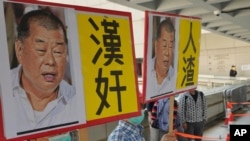A Hong Kong court will hand down verdicts on Thursday for nine prominent democrats on unauthorized assembly charges, including 82-year-old barrister Martin Lee and media tycoon Jimmy Lai, as part of an intensifying crackdown by China on its freest city.
Lee, who helped launch the city's largest opposition Democratic Party in the 1990s and is often called the former British colony's "father of democracy," is accused of taking part in an unauthorized assembly on Aug. 18, 2019, and could be jailed for 12-18 months, according to some legal experts.
Lee, Lai, and five other defendants including prominent barrister Margaret Ng and veteran democrats Lee Cheuk-yan, Leung-kwok-hung, Albert Ho, Cyd Ho, had pleaded not guilty.
During the trial, defense lawyers argued that freedom of assembly is a constitutional right in Hong Kong and noted that police had approved the peaceful demonstration in the city's downtown Victoria Park, which grew into an unauthorized march as numbers swelled into the hundreds of thousands.
The prosecution argued that the freedom of assembly isn't absolute in Hong Kong.
Only two democrats, Au Nok-hin and Leung Yiu-chung, pleaded guilty.
Critics, including Western governments, have condemned the arrests of Lee and other democrats amid the ongoing crackdown. Forty-seven other high-profile democratic campaigners are facing subversion charges under the national security law and have mostly been denied bail and are being held in detention.
The U.S. said on Wednesday that Hong Kong does not warrant preferential treatment under the Hong Kong Policy Act, a law that had allowed Washington to maintain a special relationship with the city.
Secretary of State Antony Blinken said in a news release that China had "severely undermined the rights and freedoms of people in Hong Kong," through arbitrary arrests and politically motivated prosecutions as well as "pressure on judicial independence and academic and press freedoms."
The 2019 pro-democracy protests were spurred by Beijing's tightening squeeze on wide-ranging freedoms promised to Hong Kong upon its return to Chinese rule in 1997 and plunged the semi-autonomous city into its biggest crisis since the handover.
Beijing has since imposed a sweeping national security law, punishing anything it deems as secession, subversion, terrorism or collusion with foreign forces with up to life in prison.
Since the law's promulgation, the government has jailed activists and democrats, barred protests and curbed political expression, and imposed an overhaul of the city's electoral system to ensure only pro-China "patriots" govern Hong Kong.





